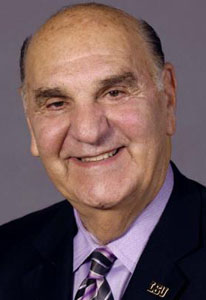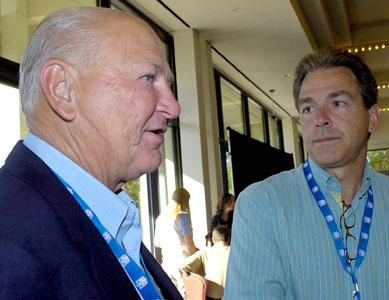LSU Short Story
Everything Matters in Baseball: The Skip Bertman Story, Glenn Guilbeau (2022)
From his first days on the job as Athletic Director, Skip Bertman coached the coaches regularly - even one making millions more than he did.
"Oh, I loved him," Alabama football coach Nick Saban said in an exclusive interview in 2019. "Skip was a little different because most of the guys who had been athletic directors where I coached had not been coaches. Maybe they were coaches for a while, but never head coaches like Skip."
"He had a unique perspective on what it was like to be in that chair," Saban said. "He had a lot of infinite wisdom about little things that he could help you with."
Bertman, for example, told Saban to smile more and tell a joke here and there.
"Even if they were public relations-type things, or maybe managing a certain kind of situation," Saban said. "It was a learning experience for me."
Bertman knew not to try to micro-manage Saban.
"He was great because he left you alone," Saban said. "He didn't try to tell you what to do or how to do it, and he let you run your program. But he was very helpful with some of his insight."
Bertman would often counsel Saban or basketball coach John Brady and other coaches when they got upset about something in the newspaper concerning their team or themselves.
"Hey, forget about it. It's just one day. There'll be another paper tomorrow," Bertman would say.


L-R: Skip Bertman, Wayne Huizenga, Nick Saban
Associate Athletic Director Verge Ausberry saw Bertman and Saban as very similar and in the mold of former LSU football coach Bill Arnsparger, whom Ausberry played for as a freshman linebacker in 1986.
"They were the same kind of coaches," he said. "There were some egos, but Skip knew Nick was the best. He'll always tell you that. And Nick respected Skip. Both were like Arnsparger in that they weren't going to compliment you. I could deal with it because Arnsparger didn't give you compliments. It was what you were supposed to do."
Bertman knew Saban was the "best" even when Saban was not so great, such as in 2002 when LSU finished 8-5.
"Blair Barbier and I and Skip were at Mansur's restaurant in Baton Rouge after that season," former LSU P Doug Thompson said. "And LSU fans were like, 'Who's this Saban guy?' So we asked Skip what he thought. And Skip goes, 'Oooh, listen, this guy is going to go down as the greatest of all time."
"You mean at LSU?" Thompson asked.
"No, no, no," Bertman said. "I mean, like John Wooden and Bear Bryant. They're going to erect statues for him - the greatest of all time. He's got a system like ours."
"Back in the car, Blair said, 'Skip's really losing it, huh? The guy was just 8-5. Greatest of all time?' And the next year, he wins it all," Thompson said. "It's always kind of spooky to look back and realize how much Skip told the future."
Bertman also correctly predicted Saban's future when he left LSU after the 2004 season to be the Miami Dolphins coach. Saban did not enjoy himself there in 2005 and '06 as he lost more than he won for the only time in his career, and later wished he had listened to Skip.
Just before Christmas Day in 2004, while still LSU's coach, Saban had an offer of $6 million a year from Miami owner Wayne Huizenga to leave his $2.3 million LSU job and become the Dolphins new coach. But he had a hard time making up his mind - partly because the No. 1 and No. 2 recruiting classes in the nation he signed in 2003 and '04 would be blossoming in 2005.
"It's always hard because of the relationships you have with players to just walk off and leave them," Saban said. "I thought, too, we had one of the best team ever coming back the next year, in 2005."
Shortly before leaving for the Capital One Bowl in Orlando, Saban met in Bertman's office with Bertman and Richard Gill, a top executive at Shaw Industries in Baton Rouge and a former president of the Tiger Athletic Foundation.
"I remember Skip saying, 'Nick, you've just got to decide what you want your legacy to be,'" Saban said. "He said, 'Do you want it to be as a college coach? Or do you want to try to make a name for yourself as an NFL coach?'"
The question cut to the heart of Saban's decision.
"I really wanted to be a college coach, but I had it in the back of my mind all the time that the ultimate thing that you could accomplish in the profession was to be a head coach in the NFL," Saban said. "Don't ask me why, but that was just kind of there."
Saban had turned down the Chicago Bears head coaching job just days after beating Oklahoma 21-14 on Jan. 4, 2004 for the BCS National Championship.
"They tried to hire me, and I wasn't really interested," he said. "And I thought because of Mr. Huizenga the next year, the Dolphins were the right one. Skip understood that. As it turns out, what I learned from that experience in hindsight was that it was a huge mistake to leave college football."
Saban struggled to relate to professional players as Miami's head coach, though he did that well as an NFL assistant at Houston in 1988-89 and at Cleveland in 1991-94.
Still, after inheriting a 4-12 team at Miami, he won his last six games in his first season with the Dolphins in 2005 to finish 9-7 and narrowly missed the playoffs while contending for AFC Coach of the Year honors.
But he didn't enjoy it.
Then he slipped to 6-10 in 2006 and wanted out.
"I was fortunate to get another opportunity to be a college coach at Alabama," he said.
He landed at Alabama in 2007, and six national championships followed.
Had Saban listened to Bertman, he might still be building such a college legacy at LSU.
"I know a lot of LSU fans think I left for whatever reasons, but I left because I wanted to be a pro coach," Saban said. "We loved LSU. We worked hard to build the program. If there was one thing professionally that I would do over again, it would've been to not leave LSU."
Saban left a natural, geographical recruiting advantage at LSU that he has not seen at Alabama even with his success there.
"You had ... a better recruiting base at LSU, especially in the state," Saban said. "And you only had one school."
Bertman chose LSU over South Alabama for the same reason in 1983. While Alabama has historically been the top school in its state, Auburn has reigned at times and is a consistent threat to Alabama more than any Louisiana school is to LSU.
"So, even if we had as many prospects in Alabama as Louisiana does, you're battling somebody else all the time to try to get them. So it has been more challenging in recruiting here, no doubt," Saban explained.
Bertman sensed that Saban's taskmaster coaching style would be best in college because Bertman coached the same way - which was one reason why he never pursued coaching in Major League Baseball.
"I said, 'Mr. Huizenga, you're making a big mistake,'" Bertman recalled. "This Saban guy's not going to be successful in the NFL, although he's the greatest. The professional players won't listen to him.' And he just laughed. I think he figured I was just trying to keep our coach. 'You don't understand. You're just a coach.'"
Huizenga, who passed away in 2018, was the one, like others, who didn't understand - until Saban left the Dolphins after two seasons.